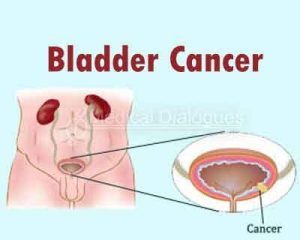- Home
- Editorial
- News
- Practice Guidelines
- Anesthesiology Guidelines
- Cancer Guidelines
- Cardiac Sciences Guidelines
- Critical Care Guidelines
- Dentistry Guidelines
- Dermatology Guidelines
- Diabetes and Endo Guidelines
- Diagnostics Guidelines
- ENT Guidelines
- Featured Practice Guidelines
- Gastroenterology Guidelines
- Geriatrics Guidelines
- Medicine Guidelines
- Nephrology Guidelines
- Neurosciences Guidelines
- Obs and Gynae Guidelines
- Ophthalmology Guidelines
- Orthopaedics Guidelines
- Paediatrics Guidelines
- Psychiatry Guidelines
- Pulmonology Guidelines
- Radiology Guidelines
- Surgery Guidelines
- Urology Guidelines
New Drug Found Effective Against Aggressive Bladder Cancer

New York : A new drug that harnesses the immune system to attack tumours has been found highly effective against advanced bladder cancer in an international clinical trial.
Injections of the experimental agent atezolizumab were found to shrink tumours by at least 30 per cent and stall new tumour growth in 28 of 119 patients.
All had received the medication as their initial therapy for the disease.
"Our new study results argue that atezolizumab represents a major advance in the treatment of bladder cancer," said lead study investigator and medical oncologist Arjun Balar, Assistant Professor at New York University Langone Medical Center in the US.
Part of a new class of drugs known as checkpoint inhibitors, atezolizumab, also known by its brand name, Tecentriq, was last month approved by the US Food and Drug Administration based on recent research from a related clinical trial presented in 2015.
"Atezolizumab is the first therapy to be approved in more three decades for this disease, and it is the new standard of care for patients whose initial therapy with platinum based chemotherapy drugs has failed," Balar said.
"Indeed, it may be the only therapy some patients need," he noted.
The current "first-line" standard of care in bladder cancer, Balar said, is cisplatin, a drug that kills tumour cells by preventing them from repairing damage to their DNA.
Atezolizumab was well tolerated by all patients in the current study, which was conducted in medical centers across the United States, Canada, and Europe, Balar said.
Checkpoint inhibitors some already approved to treat other forms of cancer are designed to "retrain the immune system" to attack tumour cells by blocking the action of proteins believed to help cancer cells evade recognition by the immune system, Balar said.
Patients reported relatively mild instances of fatigue, itchy skin, and diarrohea, which represented far fewer and less-severe side effects than seen with cisplatin or its common alternative, carboplatin, Balar noted..
As part of the study, all 21 patients still in cancer remission continue to be monitored, with some having continued to receive atezolizumab since the study started in May 2014.
The findings were presented at the annual meeting of the American Society for Clinical Oncology (ASCO) in Chicago.

Disclaimer: This site is primarily intended for healthcare professionals. Any content/information on this website does not replace the advice of medical and/or health professionals and should not be construed as medical/diagnostic advice/endorsement or prescription. Use of this site is subject to our terms of use, privacy policy, advertisement policy. © 2020 Minerva Medical Treatment Pvt Ltd